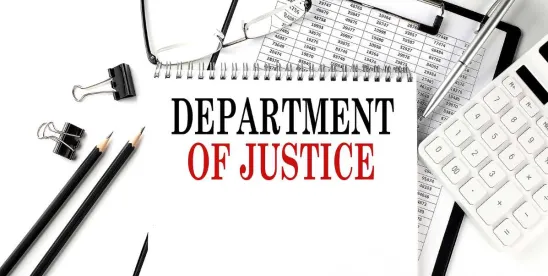The Department of Justice (“DOJ”) announced yesterday the formal launch of its Corporate Whistleblower Awards Pilot Program (“the Program”), which provides whistleblowers who submit information regarding corporate misconduct with the opportunity to receive a financial award.
The Program, which will operate for an initial three-year pilot window, will operate similarly to the Securities and Exchange Commission (“SEC”) whistleblower award program. The SEC’s program, which has proven very successful since its creation in 2010, provides incentives for individuals who blow the whistle regarding potential federal securities laws violations. The DOJ Program covers a broader scope of illegal conduct, but the detailed program guidance makes clear that to be eligible for an award, a whistleblower’s information must relate to one of following subject areas:
- “Violations by financial institutions . . . including schemes involving money laundering, anti-money laundering compliance violations, registration of money transmitting businesses, and fraud statutes, and fraud against or non-compliance with financial institution regulators.
- Violations related to foreign corruption and bribery . . .including violations of the Foreign Corrupt Practices Act, violations of the Foreign Extortion Prevention Act, and violations of the money laundering statutes.
- Violations . . . related to the payment of bribes or kickbacks to domestic public officials, including but not limited to federal, state, territorial, or local elected or appointed officials and officers or employees of any government department or agency.
- Violations related to:
(a) federal health care offenses and related crimes involving private or other non-public health care benefit programs, where the overwhelming majority of claims are submitted to private or other non-public health care benefit programs,
(b) fraud against patients, investors, and other non-governmental entities in the health care industry, where the overwhelming majority of the actual or intended loss was to patients, investors, and other non-governmental entities, and
(c) any other federal violations involving conduct related to health care not covered by the Federal False Claims Act . . .”
To participate in the Program, whistleblowers may submit original, non-public information via the DOJ’s online form, with an option to submit anonymously if the whistleblower is represented by an attorney. The DOJ will then review the information and determine whether to launch an investigation. If the investigation results in a successful prosecution with a civil or criminal forfeiture of more than $1,000,000, then the whistleblower may be eligible for an award of up to 30% of the first $100 million forfeited. Beyond that, the whistleblower may receive up to 5% of proceeds for any amounts in the range of $100 million to $500 million and will not receive any award based on amounts collected in excess of $500 million. The completely discretionary nature of the award, the tiered calculation, and the effective cap of $50 million on awards differ significantly from award calculations under the SEC whistleblower program, which generally provides for a flat 10-30% award for a successful enforcement action that recovers more than $1 million, with no caps or tiers.
After a successful forfeiture action, the DOJ will publish information about the forfeiture on a dedicated corporate whistleblower page on its website. Tipsters will then have 90 days to submit a claim form if they believe the information they provided contributed to the forfeiture. This mirrors the SEC’s processes and may create similar challenges for whistleblowers.
Importantly, individuals who are eligible for an award through another U.S. government, statutory whistleblower, or qui tam program, such as the SEC’s program, are not eligible for an additional award from the DOJ. The DOJ advises whistleblowers who are unsure of their eligibility under multiple programs to submit information to more than one program.


 />i
/>i

